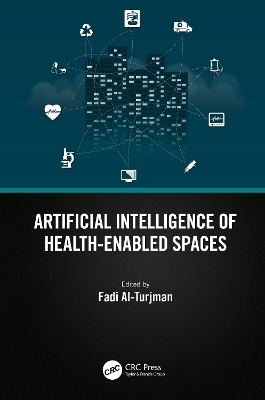
Artificial Intelligence of Health-Enabled Spaces
CRC Press (Verlag)
978-1-032-34580-2 (ISBN)
Artificial Intelligence of Health-Enabled Spaces (AIoH) has made a number of revolutionary advances in clinical studies that we are aware of. Among these advances, intelligent and medical services are gaining a great deal of interest. Nowadays, AI-powered technologies are not only used in saving lives, but also in our daily life activities in diagnosing, controlling, and even tracking of COVID-19 patients. These AI-powered solutions are expected to communicate with cellular networks smoothly in the next-generation networks (5G/6G and beyond) for more effective/critical medical applications. This will open the door for other interesting research areas. This book focuses on the development and analysis of artificial intelligence (AI) model applications across multiple disciplines. AI-based deep learning models, fuzzy and hybrid intelligent systems, and intrinsic explainable models are also presented in this book. Some of the fields considered in this smart health-oriented book include AI applications in electrical engineering, biomedical engineering, environmental engineering, computer engineering, education, cyber security, chemistry, pharmacy, molecular biology, and tourism.
This book is dedicated to addressing the major challenges in fighting diseases and psychological issues using AI. These challenges vary from cost and complexity to availability and accuracy. The aim of this book is hence to focus on both the design and implementation aspects of AI-based approaches in the proposed health-related solutions.
Targeted readers are from varying disciplines who are interested in implementing the smart planet/environments vision via intelligent enabling technologies.
Prof. Dr. Fadi Al-Turjman received his Ph.D. in computer science from Queen’s University, Canada, in 2011. He is the associate dean for research and the founding director of the International Research Center for AI and IoT at Near East University, Nicosia, Cyprus. Prof. Al-Turjman is the head of Artificial Intelligence Engineering Dept., and a leading authority in the areas of smart/intelligent IoT systems, wireless, and mobile networks’ architectures, protocols, deployments, and performance evaluation in Artificial Intelligence of Things (AIoT). His publication history spans over 400 SCI/E publications, in addition to numerous keynotes and plenary talks at flagship venues. He has authored and edited more than 40 books about cognition, security, and wireless sensor networks’ deployments in smart IoT environments, which have been published by well-reputed publishers such as Taylor and Francis, Elsevier, IET, and Springer. He has received several recognitions and best papers’ awards at top international conferences. He also received the prestigious Best Research Paper Award from Elsevier Computer Communications Journal for the period 2015-2018, in addition to the Top Researcher Award for 2018 at Antalya Bilim University, Turkey. Prof. Al-Turjman has led a number of international symposia and workshops in flagship communication society conferences. Currently, he serves as book series editor and the lead guest/associate editor for several top tier journals, including the IEEE Communications Surveys and Tutorials (IF 23.9) and the Elsevier Sustainable Cities and Society (IF 7.58), in addition to organizing international conferences and symposiums on the most up to date research topics in AI and IoT.
About the Editor. List of Contributors. Chapter 1 IoT and Machine Learning-Based Smart Healthcare System for Monitoring Patients. Chapter 2 Detection and Diagnosis of COVID- 19 from Chest X-Ray Images Using Deep Learning. Chapter 3 Analysing the Stages of Diabetic Retinopathy Using Deep Learning Techniques. Chapter 4 COVID-19 Detection Based on Deep Learning Feature Extraction and AdaBoost Ensemble Classifier. Chapter 5 Deep Learning and Transfer Learning Models for Detection of COVID-19. Chapter 6 Industry 4.0 Challenges and Applications in the Healthcare Industry with Emerging Technologies. Chapter 7 Cyber-Security Countermeasures and Vulnerabilities to Prevent Social-Engineering Attacks. Chapter 8 Development of a COVID-19 Tracking System. Chapter 9 An Overview of Autonomous Perception for a Robotic Arm. Chapter 10 Artificial Intelligence-Based Methods for SARS-CoV-2 Detection with CRISPR Systems. INDEX.
| Erscheinungsdatum | 11.07.2023 |
|---|---|
| Zusatzinfo | 16 Tables, black and white; 45 Line drawings, black and white; 37 Halftones, black and white; 82 Illustrations, black and white |
| Verlagsort | London |
| Sprache | englisch |
| Maße | 156 x 234 mm |
| Gewicht | 420 g |
| Themenwelt | Informatik ► Theorie / Studium ► Künstliche Intelligenz / Robotik |
| Medizin / Pharmazie ► Gesundheitswesen | |
| Recht / Steuern ► Privatrecht / Bürgerliches Recht ► IT-Recht | |
| Wirtschaft ► Betriebswirtschaft / Management ► Planung / Organisation | |
| Wirtschaft ► Volkswirtschaftslehre | |
| ISBN-10 | 1-032-34580-2 / 1032345802 |
| ISBN-13 | 978-1-032-34580-2 / 9781032345802 |
| Zustand | Neuware |
| Haben Sie eine Frage zum Produkt? |
aus dem Bereich


